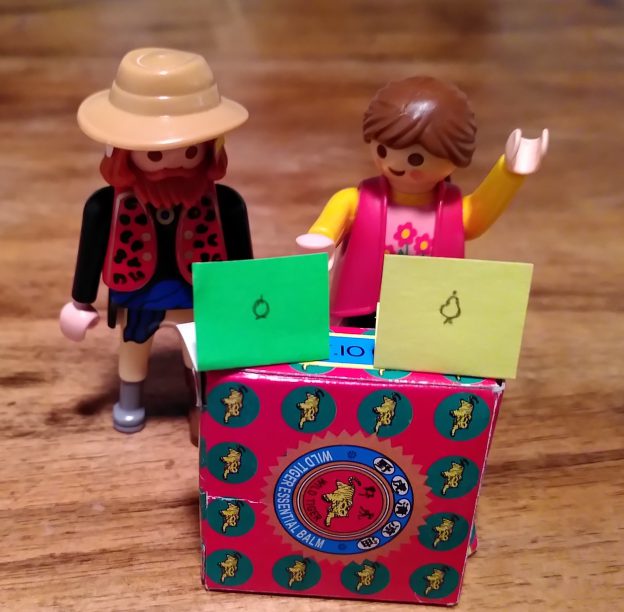
Am I in the wrong film?
„This just can’t be true!“ thinks Paul in the middle of an online meeting for which he had been commissioned as facilitator. A few more or less successful interventions and about two hours later the meeting is over and Paul’s energy reserves are quite depleted. This is also how he describes the situation when he meets up a few days later with his four colleagues – all of whom are experts in working in and with groups – for an exchange. After months in the online format, the multi-professional group is finally meeting physically again – equipped with daily updated Coronatest results.
Lack of clarity about expectations
„I was commissioned to accompany a coordination process. I found myself in a tangible conflict that cannot be dealt with because it should not exist,“ Paul continues. Rudi and Yasemine nod and let the others know that they also know such situations. „Even if there is a detailed clarification of expectations with the client in advance, it can happen that you don’t get told important things,“ Yasemine speaks from her own experience.
Paul immediately chimes in, because that’s exactly what happened to him. He had already suspected during the clarification meeting that there might be difficulties in the cooperation between the meeting participants, which had already existed for years. When he brought this up, however, he received a very clear rebuff. „In retrospect, the client’s reaction seemed to be a very strong impulse that was somehow not adequate to my question. But I took the answer seriously,“ Paul adds and is then supported by Rudi, who says: „I always find it a challenge to distinguish between the concerns – to be clear about what I would find good to work on and what I was REQUESTED to work on.“
Revealing irritations
Paul then goes on to say that during the meeting he had also brought up and explained again exactly what he had been commissioned with in his opinion and in which direction he could now also work. In doing so, he wanted to bring in more clarity and also offer the possibility of making a new assignment. However, this was – not surprisingly – not possible in this situation and was even ignored by some participants.
Maria now also associates a concrete situation with the topic of unclear expectations. She tells of a specialised training on communication culture for the staff of a department of a larger organisation: „That was quite a tough game and it took me more than half a day to find out that they didn’t want to do it at all. They were forced to do it by the department management and felt that the training was a punishment for being so bad at communicating with each other.“ Rudi shakes his head and says, „Yes, there’s nothing more you can do. It’s just annoying.“
Landing in the right film
After sharing more examples, Beate suggests taking a step towards solutions: „I am sure that we also have many good strategies for dealing with such situations – unclear expectations, involuntary or simply uninterested participants. After all, all five of us still deal with groups and the fun is greater than the frustration!“
The others react with laughter and relieved sighs as they gradually recall more and more of their diverse competences and the failed experiences come out of focus. After intensive exchange in a team of 2 and a team of 3, they present to each other what they have come up with. Many ideas emerge here and there and Rudi takes on the task of noting down all the points and summarising them in a kind of checklist titled „Helpful things so that everyone ends up in the right film“:
Questions for clarifying the assignment:
- How did the idea for the training/seminar/consultation/workshop come about?
- Who made the suggestion?
- How did the decision come about?
- Did everyone agree?
- Is participation voluntary?
- Does everyone take part?
What to do in case of irritations during/after the clarification of the mandate:
- Ask questions.
- Make room for the irritation.
- Disclose the irritation.
- Take time to let it work, possibly make a short interruption: toilet, drink, take notes.
- If the irritation is lasting, make contact again.
- Write down the initial situation and check whether everything is clear to you. If not, ask for more information.
What to do if one’s own resistance to carrying out the assignment arises:
- Self-reflection
- Exchange/intervision with bystanders/colleagues
- Supervision
During implementation:
- Clarify expectations with the participants at the beginning.
- Transparency about the triangle of tasks.
- Make the ambiguity/resistance a topic.
- Attitude: Everyone contributes to clarification, not just me as trainer/speaker.
- Make termination of the seminar an option: Along the lines of: instead of everyone being unhappy, it might be better to spend the time differently.
Afterwards:
- Debriefing with clients.
Our five protagonists take a few minutes to look over the list together. „It is always impressive what we have to think about when we work with groups and teams,“ says Beate and adds, „but of course also what we can do! Professionally strengthened, grateful for the resource that the regular exchange with colleagues represents and happy about the analogue reunion, the group moves on to the informal part of the meeting. Before that, a topic for the next meeting is decided: How can we support groups to be able to work when things go haywire?
Authors: Gerda Kolb and Irene Zavarsky
Translation: Astrid Donaubauer
Want more? You can find all the articles in the series HERE!

Dieses Werk ist lizenziert unter einer Creative Commons Namensnennung-NichtKommerziell-Weitergabe unter gleichen Bedingungen unter gleichen Bedingungen 3.0 Österreich Lizenz.
Volltext der Lizenz


